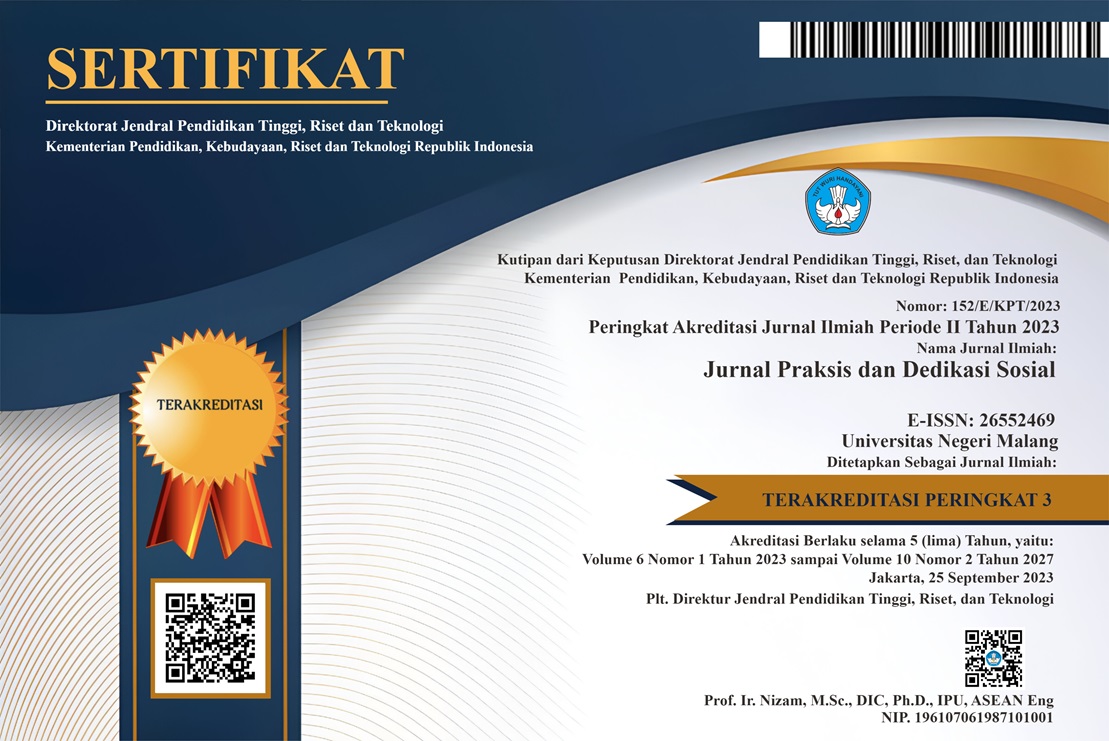MENCIPTAKAN PEREMPUAN CERDAS BERINTERNET MELALUI PENANAMAN LITERASI DIGITAL KOMUNITAS ‘RUANG BERKARYA PEREMPUAN’
Abstract
Berbagai fitur menarik yang ditawarkan oleh gadget smartphone telah menyebabkan ketergantungan dalam kehidupan sehari-hari mulai generasi orang tua hingga balita. Ketergantungan akan pemakaian smartphone juga tidak terlepas dari akses penggunaan internet yang semakin mudah. Pertumbuhan internet begitu banyak membawa pengaruh positif seperti banyaknya terserap tenaga kerja, media aktualisasi diri, dan kemudahan akses informasi. Namun, pertumbuhan internet juga tak dapat dilepaskan dari pengaruh negatif antara lain hoaks yang terdiri dari misinformasi, malinformasi, dan disinformasi. Selain itu, orangtua khususnya ibu memiliki peran yang fundamental dalam menavigasi segala tantangan yang disajikan oleh teknologi internet. Penggunaannya menjadi candu bagi balita, hingga banyak menimbulkan kekhawatiran orangtua akan berpengaruh terhadap daya tumbuh kembang anak. Melalui program literasi digital diharapkan akan menciptakan ibu-ibu cerdas untuk generasi anak selanjutnya.
Keywords
Full Text:
PDFReferences
Gelber, K. (2002). Speaking back: the free speech versus hate speech debate. Amsterdam: Benjamins Publishing Company
Granic I., Lobel A., Engels R.E. (2014). The benefits of playing video games. American psychologist, 69:66–78
Jawa Pos. (2018). Miris, Penyebar hoax mayoritas ibu-ibu (Mabel Polri tetapkan 16 Tersangka) Diakses dari: https://www.jawapos.com/hoax-atau-bukan/12/11/2018/miris-penyebar-hoax-mayoritas-ibu-ibu/
Khurana, A., Bleakley, A., Jordan, A. B., & Romer, D. (2015). The Protective Effects of Parental Monitoring and Internet Restriction on Adolescents’ Risk of Online Harassment. Journal of Youth and Adolescence, 44(5), 1039–1047. https://doi.org/10.1007/s10964-014-0242-4
M Sundus. (2017). The Impact of using Gadgets on Children. Journal of Depression and Anxiety, 07(01). https://doi.org/10.4172/2167-1044.1000296
Mastel. (2017). Hasil Survei Mastel Tentang Wabah Hoax Nasional. Diakses dari: https://mastel.id/hasil-survey-wabah-hoax-nasional-2017/
Odgers C. (2018). Smartphones are bad for some teens, not all. Nature. 554:432–434.
Ryff, C. D. (2014). Psychological Well-Being Revisited: Advances in the Science and Practice of Eudaimonia. Psychotherapy and Psychosomatics, 83(1), 10–28. https://doi.org/10.1159/000353263
Tempo. (2018). Sri Mulyani Meradang Dituding Jual Pulau Bali untuk Bayar Utang. Diakses dari: https://bisnis.tempo.co/read/1116417/sri-mulyani-meradang-dituding-jual-pulau-bali-untuk-bayar-utang
Twenge, J. M., & Campbell, W. K. (2018). Associations between screen time and lower psychological well-being among children and adolescents: Evidence from a population-based study. Preventive Medicine Reports, 12, 271–283. https://doi.org/10.1016/j.pmedr.2018.10.003
Tynes, B. M. (2007). Internet Safety Gone Wild?: Sacrificing the Educational and Psychosocial Benefits of Online Social Environments. Journal of Adolescent Research, 22(6), 575–584. https://doi.org/10.1177/0743558407303979
Undang-Undang Informasi Dan Transaksi Elektronik Tahun 2016 Pasal 28 Ayat 2. Diakses dari: https://web.kominfo.go.id/sites/default/files/users/4761/UU%2019%20Tahun%202016.pdf
Unesco. Jurnalisme, “Berita Palsu”, & Disinformasi Konteks Indonesia, Penerjemah: Wendratama. Diakses dari: http://www.unesco.or.id/publication/JurnalismeBeritaPalsuDisinformasiKonteksIndonesia.pdf
Waldron, J. (2012). The Harm in Hate Speech, 303. Cambridge: Harvard University Press
Wong, Y. C. (2010). Cyber-Parenting: Internet Benefits, Risks and Parenting Issues. Journal of Technology in Human Services, 28(4), 252–273. https://doi.org/10.1080/15228835.2011.562629
Womenwill. (2018). Persentase wanita Indonesia yang menggunakan internet sehari-hari. Diakses dari:
https://www.womenwill.com/intl/id/insights/indonesia/
DOI: http://dx.doi.org/10.17977/um032v2i2p47-53
Refbacks
- There are currently no refbacks.
Copyright (c) 2019 Jurnal Praksis dan Dedikasi Sosial (JPDS)

This work is licensed under a Creative Commons Attribution 4.0 International License.
Editorial and Administration Office:
This Journal is published by Universitas Negeri Malang, under the management of Faculty of Social Science.
Semarang St. No. 5 Building I3, Pos Code: 65145.
Phone. (0341) 551312.
Homepage: http://journal2.um.ac.id/index.php/jpds/index
E-ISSN 2655-2469
Jurnal Praksis dan Dedikasi Sosial (JPDS) is licensed under Creative Commons Attribution-ShareAlike 4.0 International License,








